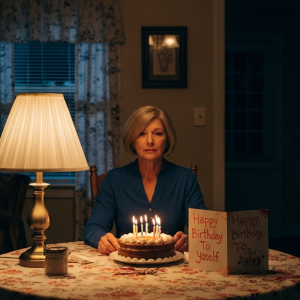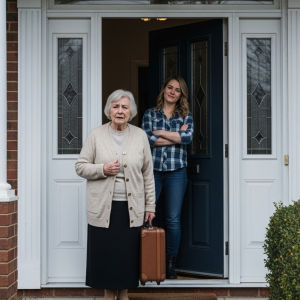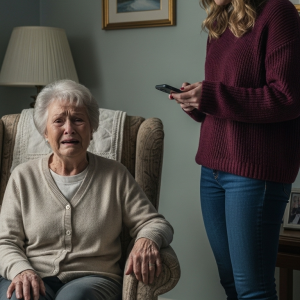When I collapsed at work, the doctors called my son. He never came. Instead, my daughter-in-law posted a family photo from my dining room table with a caption: “Finally, a day without the drama queen.” So, from my hospital bed, I made one call and sold the house they thought was theirs.
Who’s being dramatic now?
The fluorescent lights of the hospital corridor buzzed like angry insects. The doctor had called it “stress-induced heart palpitations.” At sixty-three, my body had decided it was done pretending everything was fine, even if I wasn’t.
That’s when the notification popped up. Melissa, my daughter-in-law, had tagged me in a photo. How thoughtful. I tapped the screen, expecting a generic “get well soon.” Instead, I saw my family—my son, David, and my granddaughter, Chloe—at my old dining table. They were in my house, radiant under the chandelier Tom and I had picked out together.
The caption stole the air from my lungs. “Finally, a day without the drama queen. Family dinner is so much more peaceful. #blessed #dramafree.” Forty-seven likes. My own sister-in-law had commented with laughing emojis. While I was lying alone in an emergency room, they were celebrating my absence.
The nurse returned with discharge papers. “Your son is coming to pick you up, right?”
I looked at the timestamp on Melissa’s post. Twenty minutes ago. Right when the hospital would have called David. He knew where I was. He had chosen dinner.
“Actually,” I said, my voice surprisingly steady, “I’ll call a taxi.” In the sterile lobby, I did something I hadn’t done in three years. I called my real estate agent. “Barbara, it’s Eleanor Hartwell. Remember that house on Maple Street you said would sell in a week? I’m ready to list it.”
This story, like most tales of family betrayal, began with good intentions. Three years ago, after my husband Tom’s funeral, I was a sixty-year-old widow rattling around in a four-bedroom house that echoed with memories. David and Melissa’s concern seemed like a lifeline.
“Mom, you shouldn’t be here all by yourself,” David had said, his voice thick with sympathy. “All these memories… it must be so hard.”
Their solution seemed perfect. They would move in “temporarily” to maintain the house, providing stability for Chloe, while I found a small apartment nearby. “Just until we can save for our own place,” Melissa had assured me, squeezing my hand. “A year at most.”
“Temporary” stretched into three years. My one-bedroom apartment became my world, while they lived mortgage-free in the home Tom and I had spent our lives building. Visits to my old house became awkward. My belongings were gradually moved to storage, my taste in decor painted over. I was becoming a guest in the life I had built.
But the worst part wasn’t losing the house. It was becoming invisible. And as I would soon discover, their plan was far more sinister than simply acquiring a free place to live.
Barbara Henderson, my real estate agent, answered on the first ring. “Eleanor! I was wondering when you’d come to your senses about that property.” She was all business. “That house will have offers within days, but we need to be smart.”
“How fast can you get the paperwork ready?” I asked, the image of Melissa’s smug smile burning in my mind.
“Honey, even with a rush, we’re looking at a standard thirty-day closing,” she said. “But I’m bringing my attorney friend, Patricia Morgan. She specializes in… complicated family property disputes.”
The next morning, Patricia spread documents across my tiny kitchen table. “Eleanor,” she began, her eyes sharp, “was there any formal lease agreement? Any rent paid?”
“No,” I said. “It was just family helping family.”
Patricia and Barbara exchanged a look. “That’s both good and bad,” Patricia explained. “Good, because you retain full ownership. Bad, because they might try to claim tenant protections after three years.”
Then Barbara pulled out another folder. “There’s something else. The tax records show several home improvement loans were filed against the property’s equity in the past eighteen months. Did you authorize those?”
The room tilted. “I never authorized any loans.”
Patricia leaned forward, her voice serious. “Eleanor, when was the last time you checked your credit report? If they’ve been intercepting your mail, there could be financial activity you’re completely unaware of.”
While Patricia made calls, I sat in my small kitchen, the truth crashing down on me. I hadn’t been a generous mother. I had been a target.
The phone started ringing at 7:23 a.m. the next morning. It was David. I let it go to voicemail.
“Mom, we need to talk. Some crazy woman is calling about listing the house. Obviously, there’s been a mistake. Call me back immediately.”
Obviously, there’s been a mistake. The sheer arrogance of it. The next call was Melissa. I answered.
“Eleanor, what is going on?” she demanded. “Some agent called saying she’s our listing agent. This is a scam.”
I took a slow sip of my coffee. “Actually, Barbara Henderson is my agent. And the only scam I see is the one you’ve both been running for three years.”
A shocked silence. Then, sputtered, “What are you talking about? You don’t own the house anymore. We do.”
“Living in a house and owning it are two very different things, Melissa,” I said calmly. “The deed has always been in my name.” I could almost hear the frantic calculations in her head.
“But—but we’ve put money into it! We’ve made improvements!”
“With paint I paid for,” I reminded her. “And the new roof, the washing machine, and every single utility bill for three years.”
David’s voice boomed through the speaker. I was on speakerphone. “Mom, this is insane! You can’t just sell our home out from under us!”
“Our home?” The words were a slap. “It stopped being ‘our home’ when you celebrated my medical emergency on social media.”
“What are you talking about?” Melissa asked, her voice laced with manufactured confusion.
“‘Finally, a day without the drama queen.’ Ring any bells? You posted it while I was in the ER. But don’t worry, I saw the photo. You all looked so happy.”
The line went dead quiet. When David finally spoke, the indignation was gone, replaced by a wary defensiveness. “Mom, that post wasn’t about you.”
“Of course it wasn’t,” I said, my voice dangerously soft. “Just like forgetting my birthday wasn’t about me. And David? We need to have a serious talk. In person. Today.”
“About what?”
“About the $75,000 home equity loan taken out in my name six months ago.” I hung up the phone.

While I waited for them, I began to dig. I scrolled through three years of Melissa’s social media, a curated highlight reel of a happy family life from which I was conspicuously absent. Vacations I’d never heard about. Dinner parties I was never invited to.
The comments told the real story. “Where’s David’s mom?” a friend asked. Melissa’s reply: “Oh, she prefers to stay home these days. Not very social anymore.”
Under a Christmas photo: “David’s mother is going through some things. We’re giving her space.”
They hadn’t just excluded me; they had been building a narrative. I wasn’t a mother being pushed aside; I was a recluse, a problem, a woman “going through things.” I was the drama queen.
Then Patricia called back with the full credit report. It was far worse than a single loan. Three credit cards I’d never opened. A personal loan for $30,000. Store cards, gas cards, all linked to my old address and David’s cell phone.
The charges painted a sickening picture: yoga memberships, personal trainers, private tennis lessons for Chloe she’d never mentioned taking. And then, the vacation. $8,000 for a resort in Mexico last December, while I spent Christmas alone because they were “keeping things low-key this year.”
The most recent charge was a jewelry store purchase for $3,200. The date? The day I was in the hospital.
But the coldest detail was at the bottom of the report. Inquiries from elder law attorneys and something called “Elder Care Assessment Services.” They hadn’t just been stealing from me. They had been building a case to have me declared legally incompetent
They escalated faster than I expected. By noon, Chloe was at my door, tears streaming down her face, holding a suitcase. “Grandma, please don’t make us homeless. Mom says we’ll have to live in our car.”
My heart broke. Using my twelve-year-old granddaughter as an emotional weapon was a new low. I brought her inside. Her parents waited in the car, close enough to watch, far enough to claim innocence.
“Chloe, honey,” I said gently, “did your parents explain why I’m selling the house?” She shook her head. “They just said you don’t want us to be happy anymore.”
I took a deep breath. “What if I told you that they’ve been using my name to borrow a lot of money? For things like an $8,000 trip to Mexico last Christmas.”
Her eyes widened in confusion. “We didn’t go to Mexico. I stayed with my friend Sarah’s family. Mom and Dad said they had to go help sick relatives.”
They had abandoned their daughter with friends to vacation on stolen money. These people weren’t just thieves; they were monsters.
A horn honked outside. Time for the performance to end. I walked Chloe downstairs. David rolled down his window. “Well? Did you talk some sense into her?”
I leaned down. “David, if you ever use your daughter as a pawn against me again, I will add child endangerment to the criminal charges I filed against you and your wife this morning.”
His face went slack with shock. “What criminal charges?”
“Identity theft. Credit fraud. Forgery. The $108,000 you’ve stolen from me over the last eighteen months.”
Melissa leaned across him. “We haven’t stolen anything! That was for family needs!”
“Family needs?” I laughed, a raw, humorless sound. “Like the vacation Chloe didn’t go on? Or the jewelry you bought while I was in the hospital?” I opened the back door of their car. “Chloe, you’re coming with me. Your parents need to learn how to be adults.”
Three months later, the truth emerged from an unexpected source: Melissa’s estranged sister, Jennifer. She called me, her voice trembling with anger and guilt.
“Mrs. Hartwell, I saw the news. I have to tell you something.” She explained that she had confronted Melissa, who, in a fit of rage, had admitted to everything.
“She said you forced their hand,” Jennifer cried. “That they had been planning to wait longer before starting the guardianship process, but your ‘dramatic behavior’ had rushed their timeline. They have recordings of you, photos… they were building a case to prove you were losing your mind.”
Then came the final, devastating blow.
“Fifteen years ago,” Jennifer whispered, “Melissa did something very similar to our grandmother. She moved in to ‘help’ her. Within a year, Grandma was in a nursing home with ‘dementia,’ and Melissa had power of attorney. All her money, her house… it all just disappeared.”
This wasn’t a one-time act of greed. This was a pattern. Melissa was a predator, and elderly, trusting relatives were her prey. My case wasn’t just about family betrayal anymore. It was about stopping a monster before she could hunt again.
Eighteen months later, I’m watching my granddaughter build a treehouse in the backyard of my new home in North Carolina. The legal battles are over.
David took a plea deal: two years in prison and full restitution. Melissa received community service, her claims of being a follower undermined by Jennifer’s testimony about their grandmother. Justice, it turns out, has a long memory.
I have permanent custody of Chloe. The court was not impressed by parents who abandoned their child to take luxury vacations on stolen credit. She is thriving now, away from the lies and manipulation. We are both in therapy, learning what a healthy family looks like.
I volunteer at an Elder Abuse Prevention Center, sharing my story to help others recognize the warning signs. The most dangerous predators are often the ones who call you “family.”
As I write this, Chloe calls me over to her finished treehouse. She’s hammered a hand-painted sign over the entrance. It reads:
ELEANOR & CHLOE’S CLUBHOUSE. NO DRAMA QUEENS ALLOWED.
Smart kid. She learned early that the people who call you dramatic are usually the ones creating all the drama.




